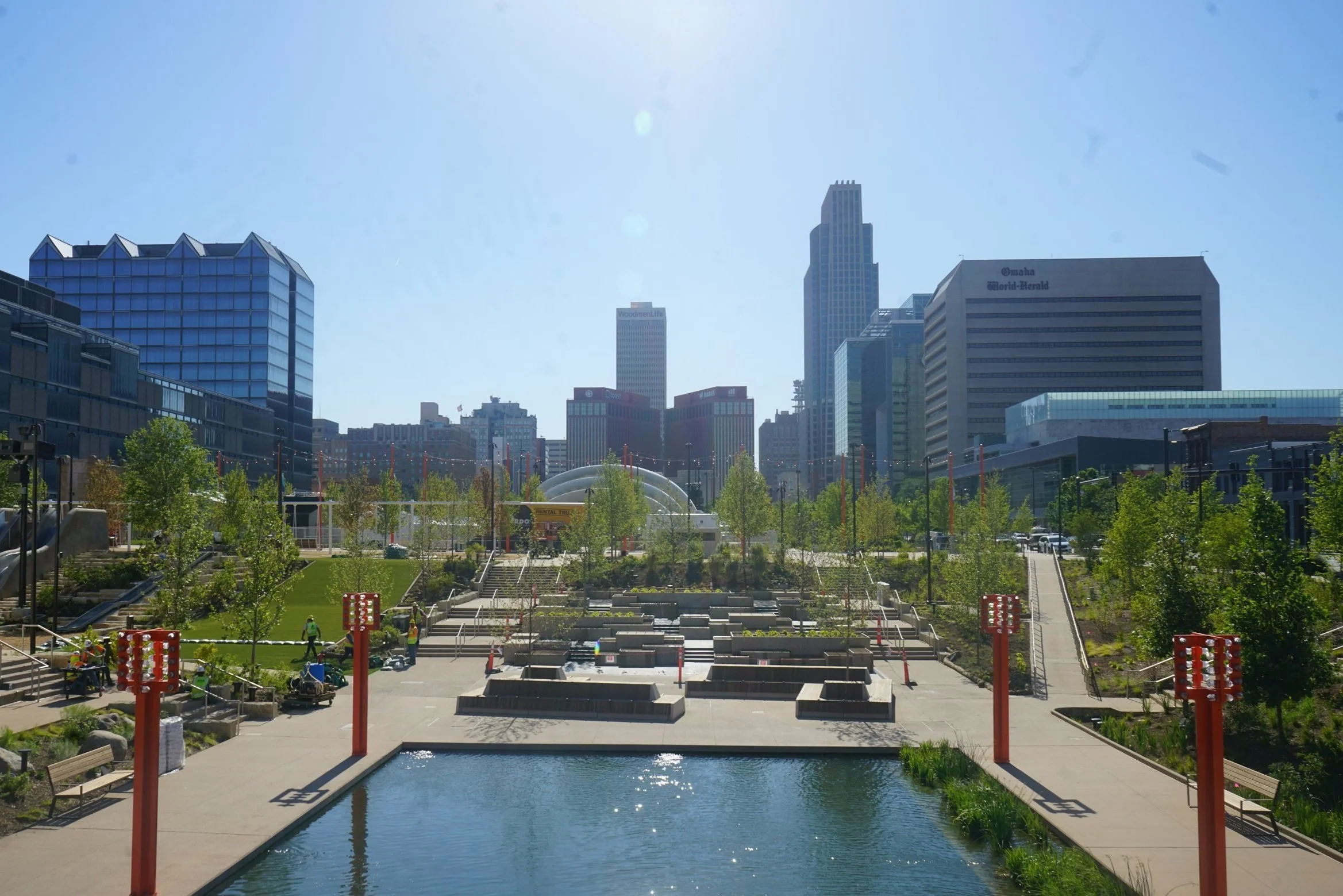A Lost Alternative
In May 2018, the Douglas County Board attempted to buy property at 420 S. 18th Street, owned by architect Bob Perrin. He refused the offer, stating that he was invested in the building. On July 10 news struck: the county voted 6-1 to use eminent domain, an attempt to seize the building for demolition, with the intent of using that site to relocate juvenile detention downtown. The takeover was necessary, the county said, to execute a one-stop model where everything for juvenile justice is located together. The lack of public discussion on the part of the county commissioners, coupled with their steady maneuvering, had citizens asking if there was another choice. Commissioner James Cavanaugh, an early opponent of the foregoing arrangements and chair of the administrative services committee, publicly stated at county meetings that he was determined to provide an alternative design, which he said was “better, cheaper, smarter” and focused on the local kids.
Something of concern was unfolding, which prompted Commissioner Mike Boyle on July 31st board meeting to tell Cavanaugh, “I would like to ask you if you would consider, at some point maybe after you wrap up with the judges, if you would have a full blown hearing here, let these folks come up. We can give and take with [the public], a total presentation, and answer their questions.” Boyle wasn’t simply asking for an alternative design, he was also insisting that local community members have a say in the development of the county justice project.
Commissioner Cavanaugh responded, “I think that’s a great idea. We anticipate doing it.”
Commissioner James Cavanaugh answers questions from the public, as he chairs the administrative services committee.
2018 Timeline: A Possible Alternative
Commissioner Boyle’s request for $20,000 in county resources to research a different plan went unrecognized by the county board. His colleagues were determined to move with their $120 million proposal, set to be managed by a private non-profit corporation. Commissioner Chris Rodgers repeated that five members on the county board had made the decision to continue with collocating downtown. Boyle and Cavanaugh proceeded to take their fellow members to task for what they believed to be right by the youth.
By late summer 2018, the county board had two undaunted opponents speaking up asking for a halt to plans. Commissioner Boyle was deliberate, “I have met with people and I’ve listened. We need to move. The juvenile detention center should not be in downtown. It doesn’t do the things we need to do. I’m concerned about the children, which all of us are at some point. We don’t need to take Mr. Perrin’s building.” On September 25, Commissioner Boyle submitted three resolutions to rescind use of eminent domain, pause plans for the downtown juvenile center in favor of more public engagement, and consider renovation of the present youth detention facilities.
The resolutions were voted down by Commissioners Mary Ann Borgeson, Clare Dude, Marc Kraft, PJ Morgan, and Rodgers.
On October 3o, the Commissioners were treated to an update by the Douglas County Unified Justice Center Development Corporation (JCDC), the nonprofit that has developing authority granted by an ancillary agreement. New developments on the official county plans consisted of estimated costs. They included $7.3 million for HDR Architecture, Inc., as architect and engineer, and $2.5 million for Burlington Capital as project manager. Commissioner Borgeson did hint that she may consider a different solution, telling opponents, “I’m looking real forward to your detail on your alternative plan, as you have asked us—as we’re doing, providing detail for this plan.”
In the meantime, Cavanaugh had his administrative services committee hold public meetings and confer with county and local experts on an alternate plan. Some in the public wanted to have a vote of the people to approve the millions in revenue bonds. Others, like the Omaha police union who oppose plans to build a smaller juvenile detention center, prefered trauma-informed designs.
Tuesday, November 20, Cavanaugh finally presented his idea of justice reform and said his alternative proposal would cost about $116 million. The two components for the his plan:
a) An educational setting and rehabilitative atmosphere for juvenile detention at DCYC, which would undergo refurbishments.
b) The courthouse annex, associated offices and legal services would have a new home on county property downtown.
His alternate did not seem to persuade the other 5 commissioners, and Cavanaugh’s presentation remained simply an idea.
December brought renewed discussion on moving the official plan to the MUD block, since Mr. Perrin was fighting eminent domain in court. His building had won landmark status from the Landmarks Heritage Preservation Commission. Following the City Planning Department’s recommendation, the Omaha Planning Board had voted 7-0 in agreement in October that the Omaha City Council grant local landmark status to the Perrin building, which would protect the old automotive dealership from demolition. City Council had the item on their agenda, but council laid it over to late January to allow Perrin’s lawsuit to pan out.
2019 Timeline: Against an Alternative
On Tuesday, January 29, Omaha City Council voted 7-0 to give historic landmark status to the building at 420 S. 18th Street. In essence, this major decision prohibits the county from constructing a juvenile detention on that site. However, that same morning Commissioner Cavanaugh had been removed from his post in the administrative committee, which was the decision of board chair Chris Rodgers. Cavanaugh had used the committee to mount opposition and dissent to official plans. Those 5 members on the board did not appreciate Cavanaugh’s attempts to persuade them and the public to keep Douglas County Youth Center at its current location, and not downtown. Rodgers’ decision had the effect of prohibiting official discussion and procedure in favor of an alternative plan.
January 24: Public Building Commission rejects $120 million bond requested from the county.
January 29: Cavanaugh is removed as chair of the administrative services committee.
January 29: City Council approves landmark designation requested by Perrin.
February 26: County board passes MUD purchase for $6.25 million.
March 18: Cavanaugh presents Alternative Plan 2.0.
March 26: Commissioners pass resolution requesting $114 million in revenue bonds from the Public Building Commission.
April 2: Douglas County Justice Center Forum, the nonprofit told participants no alternative plans would be considered.
April 11: Douglas County submitted a motion in court Thursday to dismiss the eminent domain takeover of 420 S. 18th Street.
An artist rendering of a possible alternative design for downtown. This design would keep juvenile detention at its current location at 42nd and Woolworth.
April has brought good news for opponents. Bob Perrin said the next step for him would be to determine if the county is liable for damages caused in the defense of their attempted takeover. Commissioner James Cavanaugh provided an updated alternative plan “2.0” which utilizes the MUD land purchase and keeps juvenile detention at 42nd and Woolworth. However, he cannot use county resources for his effort and must rely on citizen volunteers for expert contributions.
“Nothing is ever lost nor can be lost.” -Walt Whitman
This coverage was written by Luis E. Jimenez. He is the civic contributor in our NOISE team and regularly attends Douglas County Board of Commissioners meetings and follows Nebraska politics.












